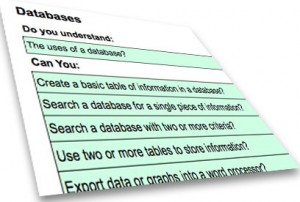 I was recently asked to create a training programme for staff to develop their ICT capabilities as part of a piece of work we were doing at Cleveratom. Creating a training schedule is actually quite an open-ended task, so I thought it best to do a needs analysis first to find out where everyone thought they needed help.
I was recently asked to create a training programme for staff to develop their ICT capabilities as part of a piece of work we were doing at Cleveratom. Creating a training schedule is actually quite an open-ended task, so I thought it best to do a needs analysis first to find out where everyone thought they needed help.
The analysis consists of three sections of questions related to different skill levels using ICT for learning. The first level focuses on basic skills – email, internet browsing and so on, and looks at the extent the participant is confident in using these technologies for themselves and for their pupils. It goes on to more advanced skills, looking at video and audio, interactive white boards (that perhaps should be a ‘basic’ skill by now) and other more creative activities. It completes with a look at the use of ICT to support the wider professional effectiveness.
The questions are simple, but the discussion around them is very important. Running this as a group session enabled people to talk to each other about what their fears and concerns were and really get to grips with the notion of what they need. Revealing the tensions and concerns as a group added weight to the process for sure, and rather than keeping their responses private I was pleased to see the level of openness in the group.
Developing a needs analysis questionnaire is quite interesting in itself, and strangely there are very few available using a google search. One or two very simple ones (how to hold a mouse, turn on or off the computer and similar) but nothing of real substance. This is fine, of course, and I expect there are commercially available schemes, but I wanted to create a unique tool for the occasion.
From the outset it was intended to create sections that tested people in different ways. A needs analysis for ICT is not going to be the same for a teacher as it is for a learning support assistant if a section is all about planing, assessment and delivery of a lesson (it may be, but not in the same way that it is for a teacher, perhaps). Therefore in introducing the survey it was important to explain that not all questions will apply, and where it is clearly not relevant, not to spend time worrying about what you don’t know! Ultimately, if you don’t know anything about databases or control technology, but you don’t need to know these things, then that section could be left blank. It is all about what you need to know in order to be more effective in your job, and how your work relates to the curriculum being taught, not what you don’t know about in general.
Having created the needs analysis questionnaire as a paper based exercise we are now looking at how to make it more accessible through electronic means. Trouble is, if your audience are not too familiar with a web browser to begin with, how do you get them to complete the needs analysis in the first place if it is only online?
In short, if you or your organisation (be it a school, college or company) is looking to review their skills with ICT then you should start with a questionnaire that enables the analysis to take place. We would be delighted to talk to you about how the needs analysis that has now been created could help, and how this would translate into an effective staff training or development programme for improving skills, knowledge and understanding in ICT.
How do I conduct a pre-test for community nurses on Ict find their knowledge level
Hi – there are a number of ways to do this, and different approaches to take depending on what you really need to know. The ICT Needs Analysis is just one tool to help get the process going, but it is important to understand that it was originally designed for schools. There is some overlap – generic skills, for example, but your needs may well ahve to be more focussed.
If you email me directly we can go through what you need.